Are you ready to take your gardening skills to the next level? With my expert gardener advice, you’ll be greening your thumb and garden in no time! Proper planning, soil preparation, and plant selection are key to creating a beautiful and healthy garden. Starting with healthy soil that is enriched with organic matter like compost or manure is essential for strong root growth and healthy plants.
Adequate watering and feeding with balanced fertilizers or organic alternatives are crucial for their growth and development. Natural ways to control pests and diseases include companion planting, planting insect-repelling species, and using homemade solutions like garlic and pepper sprays.
Harvesting crops at the right time prevents spoilage and stimulates further growth. Finally, taking the time to relax, enjoy the garden, and share the harvest with loved ones cultivates a sense of community and appreciation for the outdoors.
Beginners should start small and focus on a few plants they enjoy, consider their local climate and conditions when choosing a planting direction, and seek advice from local experts and gardening clubs to learn more about their area’s specific requirements.
Key Takeaways:
- Proper planning is key to creating a beautiful and healthy garden.
- Starting with healthy soil enriched with organic matter is essential for strong root growth.
- Adequate watering and feeding with balanced fertilizers or organic alternatives are crucial for plant growth and development.
- Natural ways to control pests and diseases include companion planting and homemade solutions like garlic and pepper sprays.
- Harvesting crops at the right time prevents spoilage and stimulates further growth.
- Relaxing and enjoying the garden and sharing the harvest with loved ones cultivates a sense of community and appreciation for the outdoors.
- Beginners should start small, focus on a few plants they enjoy, and consider their local climate and conditions when choosing a planting direction.
Planning Your Garden for Success
The key to a successful garden starts with careful planning. Consider the size, shape, and specific plants suitable for your soil type and sunlight exposure. Before diving into the planting process, make sure to take into account the maintenance requirements of your prospective garden. This includes ensuring that the plants you choose are suitable for your soil type and can thrive in the amount of sunlight your garden receives.
| Tip | Description |
|---|---|
| Plant Selection | Take into account the specific plants you want to grow, and make sure they are appropriate for your soil type, climate, and sunlight exposure. Research the necessary maintenance requirements for each plant to ensure they can thrive in your garden. |
| Soil Preparation | Preparing your soil properly is essential for the health and growth of your plants. Boost your soil’s health and drainage by adding organic matter like compost, manure, or peat moss. |
| Watering | Adequate watering is crucial for your garden, especially during hot, dry weather. Water in the morning or evening to prevent evaporation. Make sure to strike a balance between overwatering and underwatering, as both can harm your plants. |
Researching the specific plants you want to grow and their maintenance requirements can help you plan and maintain your garden effectively. Seek advice from local gardeners or gardening clubs to gain additional insights and recommendations. Additionally, consider using natural methods like companion planting and homemade solutions to control pests and diseases in your garden.
By starting with a small garden and having a plan, using the right soil and watering techniques, and seeking advice and resources from others, you can set yourself up for gardening success.
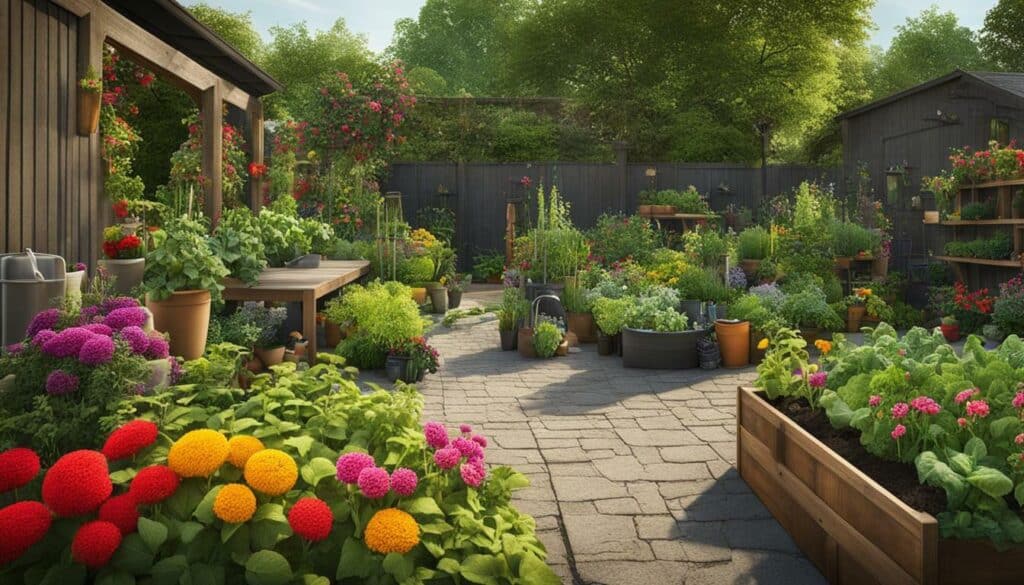
Nurturing Your Soil for Healthy Plants
Before planting, it’s essential to prepare your soil properly. Add organic matter like compost, manure, or peat moss to improve drainage and promote root health. The organic matter will also provide the necessary nutrients for your plants, resulting in healthier growth and stronger root systems.
Improving drainage is key to healthy soil. Clay soils can become compacted and hold too much water, while sandy soils can dry out too quickly, making it difficult for plants to absorb water and nutrients. Adding organic matter will help improve soil structure, allowing for better water absorption and retention.
In addition to organic matter, consider using balanced fertilizer or organic fertilizers to provide essential nutrients for your plants. Use caution with fertilizers as too much can be harmful to plants and the environment.
Natural methods are also an effective way to control pests and diseases. Companion planting, where plants are grown together to benefit each other, can help deter pests and improve soil health. Homemade solutions made with garlic, pepper, and water can be used to control insect infestations.
Harvest your crops at the right time to prevent spoilage and stimulate further growth. Overripe fruits can attract diseases and pests, so it’s essential to pick them when they’re ready. Additionally, harvesting regularly can prevent overcrowding and promote further growth.
Remember to enjoy your garden and share the bounty with others. Gardening is a rewarding hobby that can provide fresh produce, beautiful flowers, and a connection to nature. Start small, have a plan, and learn through trial and error for the best gardening experience.
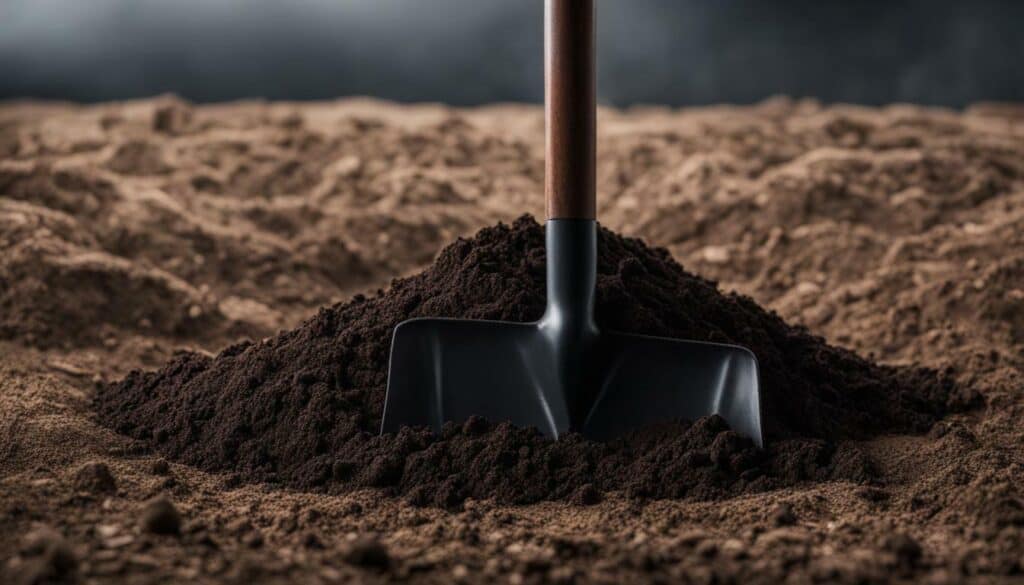
Finding the Right Balance with Watering
Watering your garden is a delicate balance – finding that sweet spot between not overwatering and underwatering. Adequate watering is essential, but it’s important not to overdo it as overwatering can cause root rot, while underwatering can cause wilting. The specific water requirements of each plant in your garden must be considered to ensure they receive the proper amount of water.
To find the right balance, water your garden enough without saturating the soil. It’s recommended to water in the morning or evening when the temperature is cooler to prevent evaporation. This helps the water to better reach the roots of your plants and keeps them hydrated throughout the day.
| Watering Tips: |
|---|
| 1. Check the soil moisture level before watering your garden. |
| 2. Water deeply and less frequently to promote root growth. |
| 3. Use drip irrigation or a soaker hose to prevent water from evaporating. |
| 4. Mulch around your plants to retain moisture and prevent weeds. |
By finding the right balance with watering, you can promote the growth and health of your garden. Remember to keep a close eye on your plants and adjust your watering schedule as needed. With proper watering techniques, you can keep your garden looking beautiful and thriving.
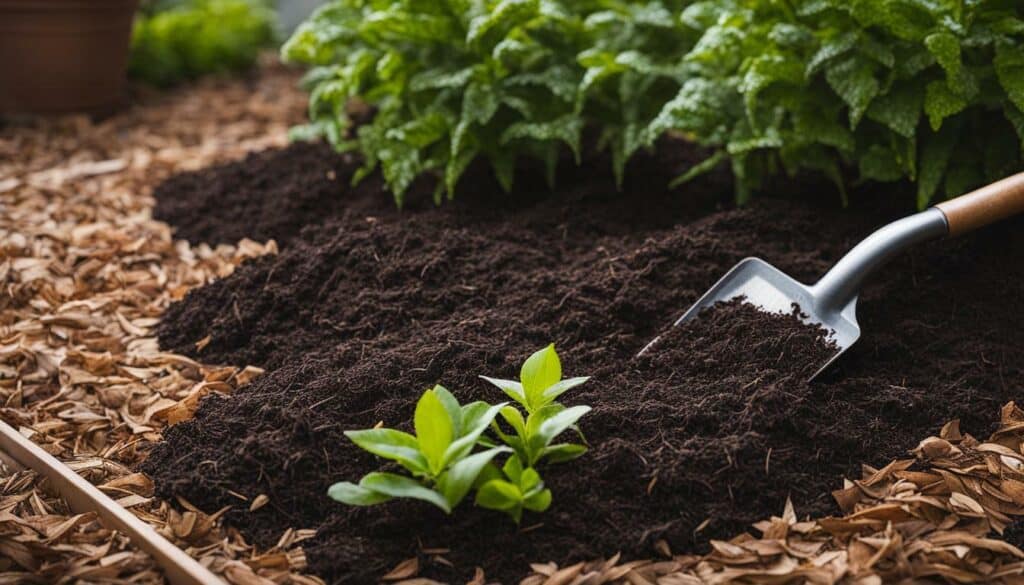
Nourishing Your Plants with Fertilizers
Just like we need proper nutrition, plants require essential nutrients too. Consider using a balanced fertilizer or opt for organic fertilizers to nourish your plants. A balanced fertilizer typically contains a mix of nitrogen, phosphorus, and potassium, which are essential nutrients for plant growth. You can also use organic fertilizers, such as compost or manure, to enrich your soil and promote strong roots.
It’s essential to consider the specific needs of your plants when selecting a fertilizer. Some plants require more nitrogen, while others prefer a higher phosphorus content. Research the specific fertilization needs of your plants to ensure optimal growth and health.
When applying fertilizer, it’s important to follow the instructions carefully. Over-fertilization can damage your plants, and under-fertilization can limit their growth. A general rule of thumb is to apply fertilizer every 4-6 weeks during the growing season, but again, be sure to check the specific requirements of your plants.
Consider using organic fertilizers to promote healthy soil and encourage beneficial insects and organisms. These fertilizers are made from natural materials, avoiding the use of harmful chemicals that can damage the environment and your plants.
Always store fertilizers safely and out of reach of children and pets. Follow any specific instructions for disposal to minimize environmental impact.

Incorporating fertilization into your garden care routine is essential for healthy and robust plant growth. Remember to consider the specific needs of your plants, follow instructions carefully, and use organic options when possible. By nourishing your plants with the proper nutrients, you’ll be rewarded with a flourishing garden full of healthy, vibrant plants.
Natural Methods for Pest and Disease Control
Dealing with pests and diseases in your garden? Don’t reach for harmful chemicals just yet. Embrace natural methods like companion planting, insect-repelling species, and homemade solutions.
Companion planting involves planting certain species near each other to deter pests. For example, marigolds can repel nematodes, while garlic can ward off aphids and spider mites. Including these plants in your garden can naturally reduce the risk of infestation.
| Plant | Insect Repelled |
|---|---|
| Marigolds | Nematodes |
| Garlic | Aphids and spider mites |
Insect-repelling species like basil, chives, and mint can also be beneficial. Adding these plants to your garden can attract beneficial insects and repel unwanted ones.
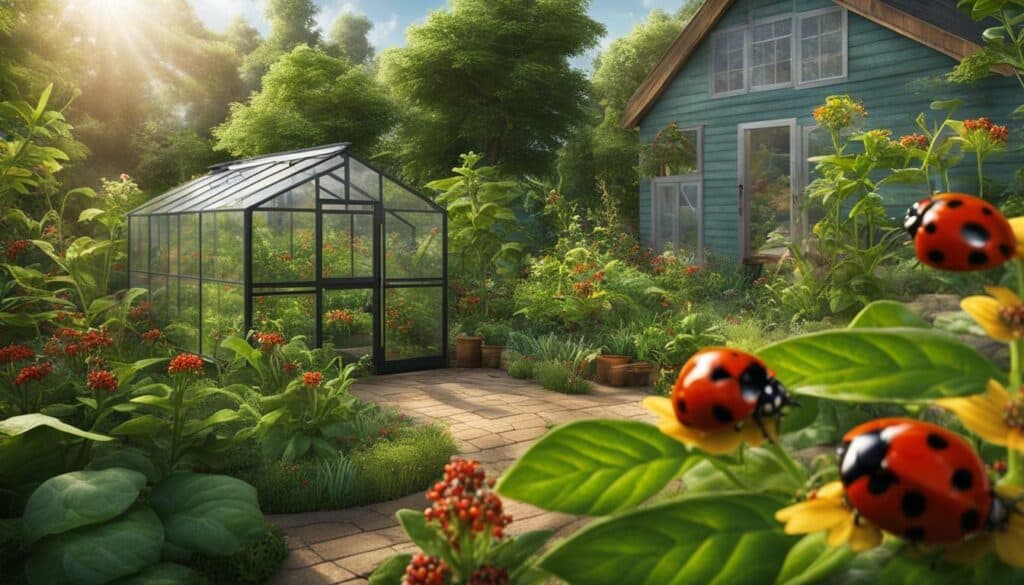
A homemade solution of garlic, pepper, and water can be an effective natural pesticide. Simply blend garlic and peppers with water and let the mixture steep overnight. Dilute the solution with water and spray it directly on the affected plants.
Monitoring your garden for signs of infestation or disease is key. Keep an eye out for yellowing leaves, spots, or wilting, which can indicate a problem. Early detection can help prevent the spread of diseases and pests.
By using natural methods for pest and disease control, you can protect your garden and keep it thriving without harming yourself, loved ones, or pets.
Harvesting for Growth and Prevention
Harvesting at the right time is essential not only for enjoying the fruits of your labor but also for promoting further growth, preventing overripening, and avoiding overcrowding, diseases, and pests.
When it comes to harvesting, it’s important to remember to check your plants daily for ripe produce. This will not only prevent overripening and spoilage but will also stimulate further growth by encouraging your plants to produce more.
| Plant | Harvesting Tips |
|---|---|
| Tomatoes | Harvest when they are firm, smooth, and fully colored. To prevent overcrowding, remove any excess leaves, fruit, or branches to ensure adequate airflow. |
| Zucchini | Harvest when they are small to medium-sized, approximately 4-8 inches in length. This will prevent overcrowding and promote further growth. |
| Peppers | Harvest when they are fully colored and firm to the touch. To prevent disease and pests, remove any damaged fruit or leaves immediately. |
In addition to promoting growth and preventing overcrowding, harvesting at the right time can also protect your plants from diseases and pests. Removing any diseased or damaged fruit or leaves can prevent the spread of disease and discourage pests from making a home in your garden.
Remember to always handle your harvested produce with care, being sure not to bruise or damage the fruit. Enjoying your fresh produce and sharing it with others is one of the greatest rewards of gardening, creating a sense of community and appreciation for the outdoors.
“Gardening requires lots of water – most of it in the form of perspiration.” – Lou Erickson
Enjoying Your Garden and Sharing the Bounty
Your garden is not just a source of fresh produce; it’s a place of joy. Create cherished memories as you enjoy your garden and share the bountiful harvest with your community.
There’s nothing quite like enjoying the fruits of your labor and sharing them with those around you. Harvesting your crops at the right time stimulates further growth, prevents spoilage, and allows you to enjoy the fruits of your labor. Additionally, sharing your homegrown produce with others fosters a sense of community and appreciation for the outdoors.
Starting small, having a plan, and seeking advice from local experts or gardening clubs can contribute to gardening success. When planning your garden, take into account the size, shape, and specific plants that are suitable for your soil type and sunlight availability. This can help ensure that your garden flourishes and provides you with fresh produce for months to come.
Prepare your soil by adding organic matter like compost or manure to help plants establish strong roots and thrive. Adequate and consistent watering is also crucial for plant health, as is feeding with a balanced fertilizer or organic alternatives.
When it comes to controlling pests and diseases, natural methods such as companion planting or homemade solutions can be effective and safe. By utilizing these methods, you can protect your garden while avoiding harmful chemicals.
Remember to use the right soil, keep critters away, learn frost dates, and plant in the north-south direction. Regularly water your garden, grow herbs for their ease of growth and fragrance, and consider mulching to conserve moisture and prevent weed growth. Additionally, misting plants with a weak brew of chamomile tea can help protect them from damping-off disease.
Gardening is a learning process, so embrace trial and error and enjoy the memories created in the process. With a little patience and effort, your garden can provide you with not only fresh produce but also a sense of joy and fulfillment.

Gardening Advice for Beginners
Just starting your gardening journey? Here’s some expert advice to help you get started and set you on the path to success.
As a beginner, it’s important to plan your garden carefully, taking into consideration the size, shape, and sunlight and water requirements of the plants you want to grow. Enhance your soil’s health and drainage by adding organic matter like compost, manure, or peat moss to promote root health and overall plant growth.
Watering is also crucial for your garden’s success. Aim for a balance between watering enough and overwatering or underwatering your plants to keep them healthy. Be sure to fertilize regularly with a balanced fertilizer or organic options to provide the necessary nutrients for your plants to flourish.
It’s best to control pests and diseases naturally by companion planting, using insect-repelling species, or making a homemade solution of garlic, pepper, and water. Harvest your crops at the right time to prevent spoilage and stimulate further growth and production.
Take time to enjoy your garden and share the produce with friends and family. Starting small with a few plants that you enjoy eating is a great way to get into gardening. Determine what you need, what you want, and what resources you already have before designing and planting your garden. Seek advice and join gardening clubs to learn from experienced gardeners in your area.
Pay attention to the direction when planting veggie rows, going from North to South. Water your plants at the right times and with the correct frequency to avoid overwatering or underwatering. Consider starting with easy-to-grow plants before attempting more challenging ones. Use mulch to help retain moisture in the soil and prevent weed growth. Mist your plants with a weak brew of chamomile tea to ward off damping-off disease.
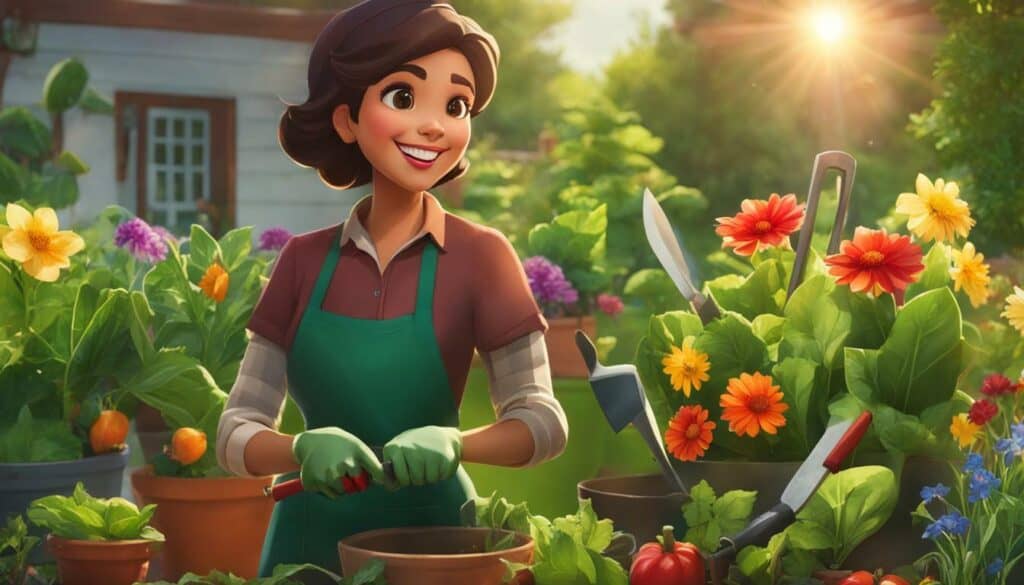
Starting a garden can be a fun and rewarding experience. By following these gardening tips for beginners, you can set yourself up for success and create a beautiful and healthy garden in no time.
Getting Started: Starting Small and Smart
As a beginner gardener, it’s best to start small and focus on a few plants or herbs that you enjoy eating. Before you start planting, it’s important to consider the size and shape of your garden, the specific plants you want to grow, and their sunlight and water requirements. Choose plants suitable for your soil type and sunlight conditions. Here are some tips to help you get started:
- Plan your garden: Consider the size and shape of your garden, the specific plants you want to grow, and their sunlight and water requirements. Choose plants suitable for your soil type and sunlight conditions.
- Prepare your soil, water your garden, and feed your plants: Use organic matter like compost, manure, or peat moss to improve soil health and drainage. Water your plants adequately, finding a balance between overwatering and underwatering. Use balanced fertilizers or organic fertilizers to provide nutrients to your plants.
- Control pests and diseases naturally: Look out for signs of infestation or disease and use natural methods to control pests, such as companion planting and homemade solutions of garlic and pepper. Avoid using harsh chemicals that can harm the environment.
- Harvest your crops at the right time: Harvesting your crops promptly not only prevents spoilage but also stimulates further growth and production. Regular harvesting can help prevent overcrowding, disease, and pests in your garden.
- Enjoy your garden and share with others: Take the time to enjoy the beauty and abundance of your garden. Share your homegrown produce with friends and family to create a sense of community and appreciation for the outdoors.
If you are a beginner, start small and choose two or three fruits, vegetables, or herbs that you enjoy eating. Consider your specific needs and what resources you already have before investing in new tools or materials. Seek guidance from local gardening clubs or experts in your area for personalized advice. Remember to water your plants at the right times, provide adequate sunlight, and use mulch to conserve moisture and prevent weeds. Finally, have fun and embrace the learning experience of gardening.
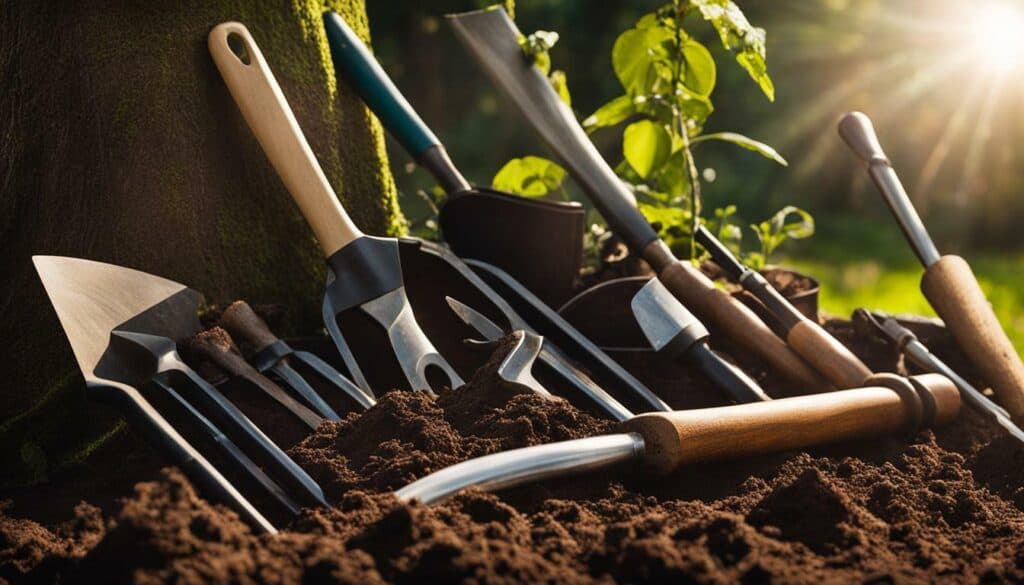
Starting small with your garden can lead to big rewards. By following these tips, you’ll be well on your way to growing your own healthy and delicious produce. Remember to plan carefully, nurture your soil, control pests naturally, harvest your crops at the right time, and share the bounty of your garden with others. Happy gardening!
Tips for Easy Plant Growth and Care
To ensure easy plant growth and care, select the right soil, keep critters away, feed your plants regularly, and consider growing herbs and other easy-to-manage plants. When planning your garden, think about the size, shape, and sunlight requirements of the plants you want to grow.
The right soil is essential for healthy plants. If you’re not sure what type of soil you have, get it tested. Once you know your soil type, you can choose plants that are suitable for it. Adding organic matter, such as compost or well-rotted manure, can improve drainage and root health.
Keep critters away from your plants by using natural pest control methods. Companion planting and insect-repelling species can help control pests without the use of harsh chemicals. Homemade solutions, such as garlic spray or neem oil, can also be effective.
Feed your plants regularly with a balanced fertilizer that provides essential nutrients. Organic fertilizers, such as seaweed or fish emulsion, are good options. Be careful not to over-fertilize, as this can cause damage to the plants.
Consider growing herbs and other easy-to-manage plants. Herbs like basil and parsley require little maintenance and can be grown in small spaces. Easy-to-grow plants, like cherry tomatoes and zucchini, are also good options for beginners.
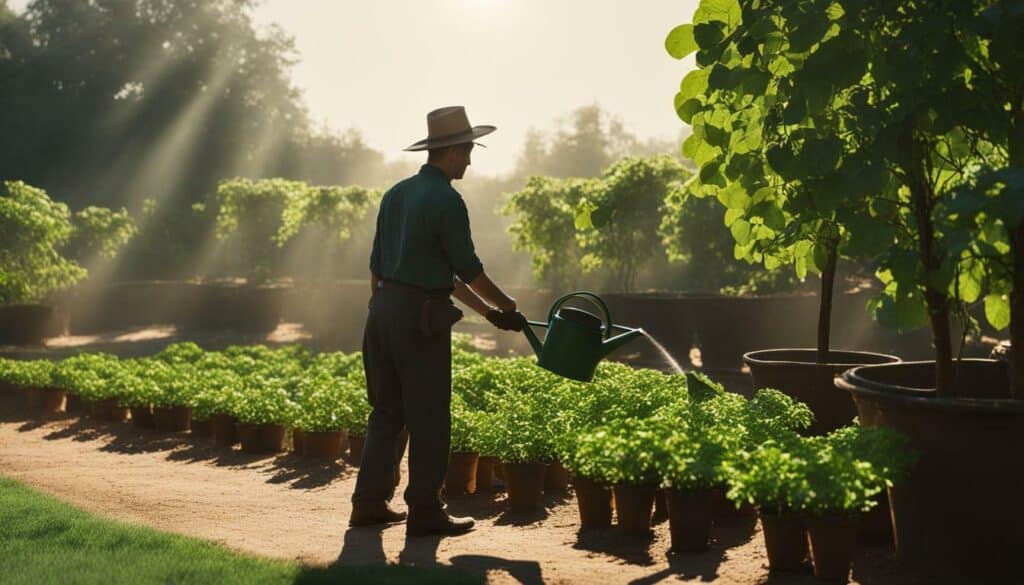
With the right planning and care, your garden can thrive. Harvest crops at the right time to stimulate further growth and prevent overcrowding, diseases, and pests. Make sure to take the time to enjoy your garden and share its bounty with others. Gardening can be a rewarding and enjoyable experience for beginners and seasoned pros alike.
Conclusion
With these expert gardener tips under your belt, you’re well on your way to transforming your garden into a thriving green oasis. Gardening can be a rewarding and enjoyable hobby that provides fresh produce, beautiful flowers, and a connection to nature. To create a flourishing garden, it is important to plan your garden, prepare the soil, water and feed your plants adequately, control pests and diseases, harvest your crops at the right time, and take time to enjoy your garden.
Remember to start small and have a plan, seeking advice from local experts and learning through trial and error. Whether you’re a seasoned gardener or just starting out, these tips can help you develop a green thumb and create your own little piece of paradise.
So go ahead, enjoy the fresh air and sunshine as you tend to your garden. Share your homegrown produce with friends and family, and create cherished memories in your own backyard. By following these tips, you can experience the joy and satisfaction of gardening while also contributing to a sense of community and connection to the natural world.
Happy gardening!
How Can Beginner Gardeners Improve Their Skills with Expert Gardener Advice?
Beginner gardeners seeking to sprout their skills can benefit from expert gardener advice. By implementing useful beginner garden ideas to sprout skills, such as starting with easy-to-grow plants and learning basic gardening techniques, novices can build a solid foundation. Additionally, seeking guidance from experienced gardeners and joining online gardening communities can provide valuable insights and further enhance their skills.
What Are Some Expert Tips and Advice for Beginner Gardeners?
For beginner gardeners, the ultimate gardening tips and advice can be a game-changer. Start by choosing the right plants for your region and garden space. Invest in quality tools and ensure proper soil preparation. Regular watering, weeding, and pest control are essential. Lastly, don’t forget to learn and adapt from your gardening experiences.
FAQ
Q: How should I plan my garden?
A: Plan your garden carefully, considering factors like size, shape, and specific plants suitable for your soil type and sunlight exposure.
Q: How can I prepare my soil for healthy plant growth?
A: Prepare your soil by adding organic matter like compost, manure, or peat moss to improve drainage and root health.
Q: What is the best way to water my garden?
A: Find a balance between not overwatering and underwatering. Water in the morning or evening to prevent evaporation.
Q: How can I provide essential nutrients for my plants?
A: Use a balanced fertilizer or organic fertilizers to provide essential nutrients for your plants.
Q: How can I control pests and diseases in my garden?
A: Use natural methods like companion planting, insect-repelling species, and homemade solutions of garlic, pepper, and water to control pests and diseases.
Q: When should I harvest my crops?
A: Harvest your crops at the right time to prevent overripening and stimulate further growth and production.
Q: How can I enjoy my garden and share my produce with others?
A: Enjoy your garden and share your homegrown produce with others, creating cherished memories and a sense of community.
Q: What advice do you have for beginner gardeners?
A: Start small and focus on a few plants or herbs that you enjoy eating. Consider the direction of planting veggie rows, learn the frost dates for your zone, and use the right soil for optimal plant growth.
Q: What are some easy-to-grow plants for beginners?
A: Start with easy-to-grow plants like zucchini, tomatoes, herbs, and peppers. Also, consider growing herbs as they are easy to grow and add great aroma to your garden.
Q: How can I prevent damping-off disease in plants?
A: Use a weak brew of chamomile tea to prevent damping-off disease in plants.
Source Links
- https://evashockey.com/gardeninghacksgreenthumb/
- https://www.lancasterhomes.ca/green-thumbs-up-expert-gardening-tips-for-a-flourishing-garden/homeowner-hints/
- https://www.nextavenue.org/you-can-have-a-green-thumb/
- https://camillestyles.com/design/gardening-tips-for-beginners/
- https://oldworldgardenfarms.com/2023/01/01/planning-a-garden/
- https://therelaxedgardener.com/blogs/martinis-and-marigolds/divine-design-5-tips-for-successful-garden-planning
- https://www.bhg.com/gardening/yard/garden-care/ten-steps-to-beginning-a-garden/
- https://extension.umn.edu/managing-soil-and-nutrients/living-soil-healthy-garden
- https://extension.psu.edu/practical-tips-for-healthy-soil-in-a-home-garden
- https://www.housebeautiful.com/uk/garden/a38746812/garden-soil-plants/
- https://www.almanac.com/when-water-your-vegetable-garden-watering-chart
- https://www.gardena.com/int/garden-life/garden-magazine/10-golden-rules-for-watering/
- https://www.homesandgardens.com/gardens/how-long-should-you-water-your-garden-with-a-sprinkler
- https://www.lyngsogarden.com/community-resources/using-organic-fertilizers-in-your-gardens/
- https://bonnieplants.com/blogs/garden-fundamentals/the-basics-of-fertilizing
- https://www.finegardening.com/article/fertilizing-basics
- https://gardeningsolutions.ifas.ufl.edu/care/pests-and-diseases/pests/management/natural-pest-and-disease-management.html
- https://shiplapandshells.com/natural-and-organic-garden-pest-control/
- https://www.gardeners.com/how-to/managing-garden-pests-diseases/5064.html
- https://piedmontmastergardeners.org/article/guidelines-for-harvesting-vegetables/
- https://extension.umn.edu/planting-and-growing-guides/harvesting-and-storing-home-garden-vegetables
- https://extension.umn.edu/yard-and-garden-news/harvest-your-garden-produce-safely
- https://growagoodlife.com/share-the-harvest/
- https://www.theguardian.com/lifeandstyle/2023/jul/02/july-is-a-month-of-bounty-and-sharing
- https://tioga.cce.cornell.edu/gardening/harvest-share-tables-are-a-great-way-to-share-your-garden-bounty
- https://www.almanac.com/10-tips-beginner-gardeners
- https://www.gardenersworld.com/how-to/grow-plants/gardening-for-beginners-10-tips/
- https://www.foodnetwork.com/grilling/grilling-central-how-tos/beginner-gardening-mistakes-to-avoid
- https://simplysmartgardening.com/gardening-101-beginning-gardener/
- https://www.bhg.com/gardening/yard/garden-care/gardening-tips-for-every-gardener/
- https://www.ncbi.nlm.nih.gov/books/NBK373975/
- https://growingourown.wordpress.com/6-conclusion/
- https://www.betterhealth.vic.gov.au/health/healthyliving/gardening-for-children

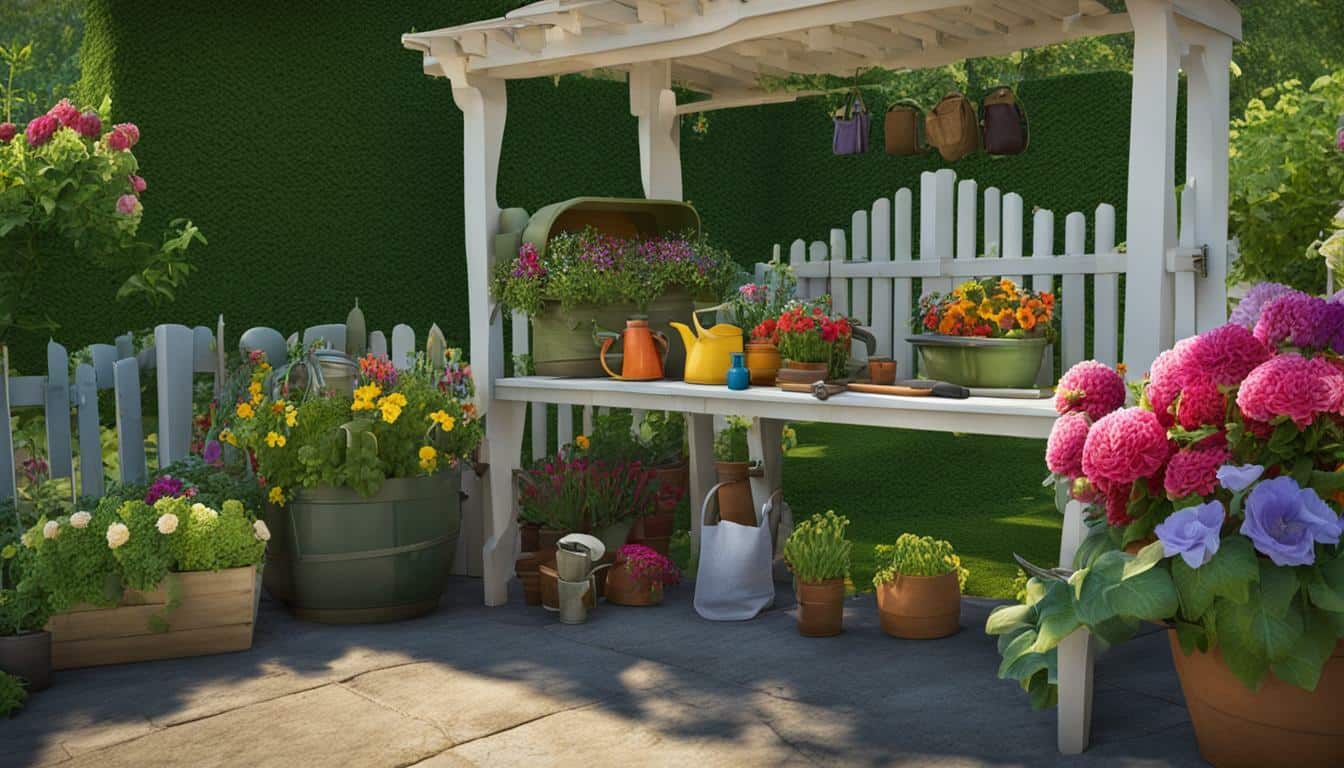
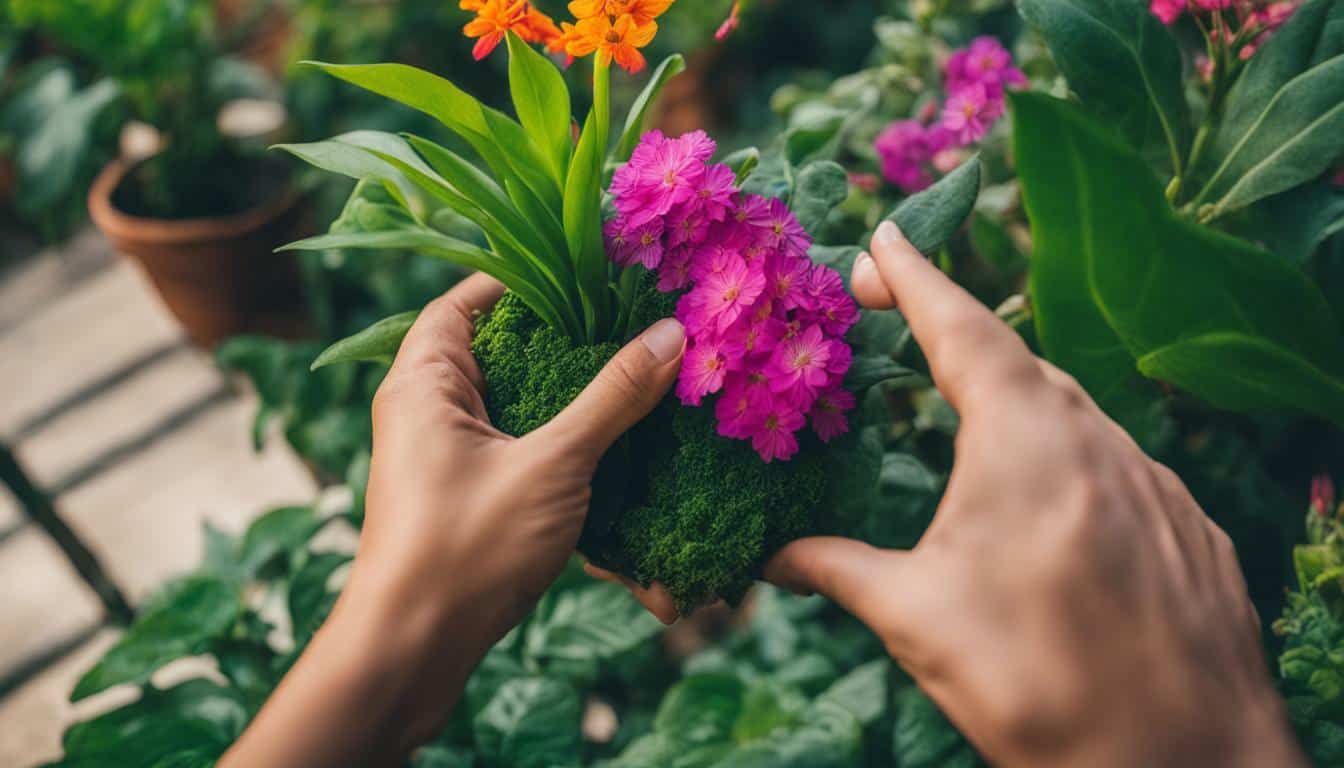
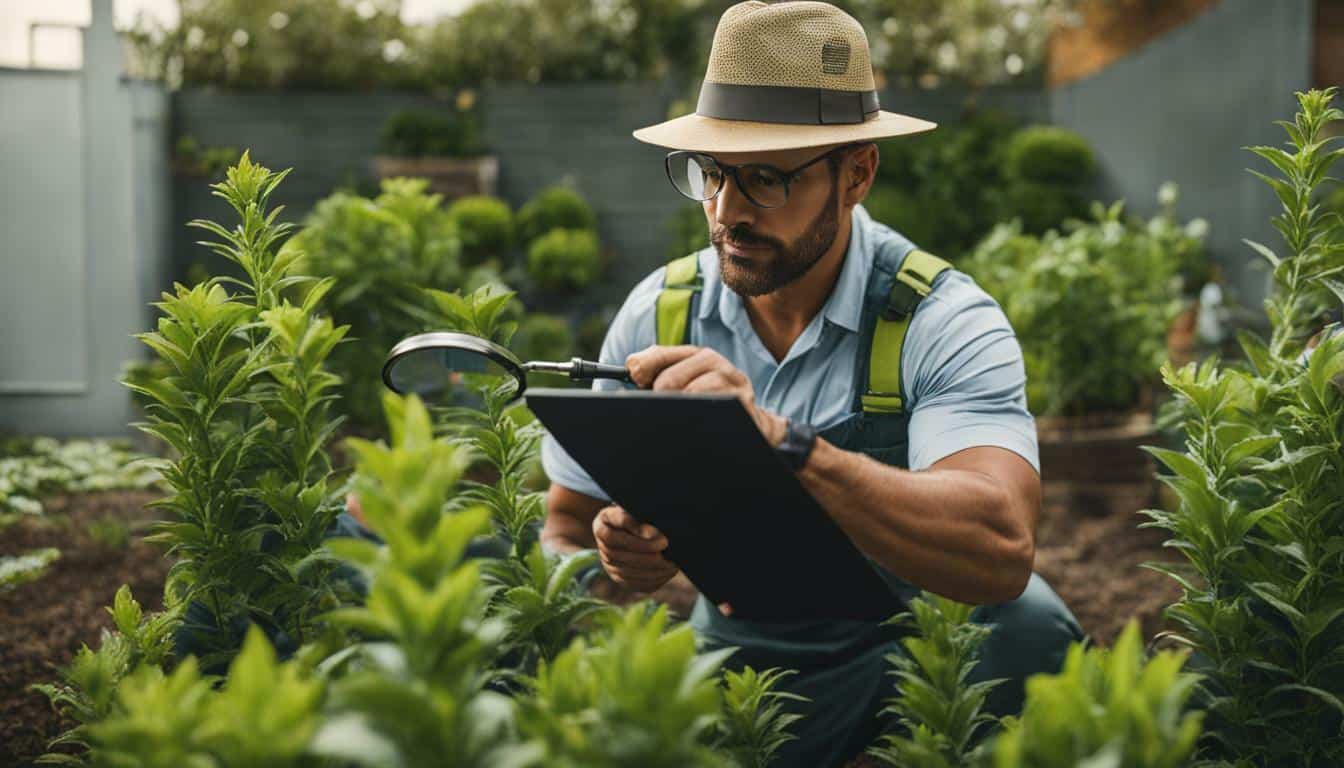

Leave a Reply